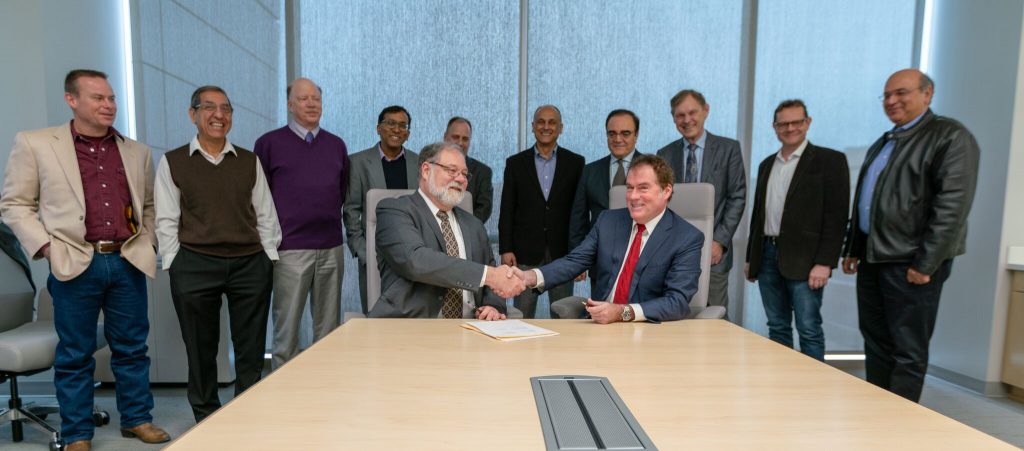Texas A&M signs strategic pact with Jet Propulsion Laboratory

Mark A. Barteau, vice president for research at Texas A&M University, shakes hands with Michael M. Watkins, director of the Jet Propulsion Laboratory, after signing a three-year strategic partnership between the institutions. Standing are representatives from the laboratory and faculty members from Texas A&M’s colleges of engineering, science and geosciences. (Image: College of Engineering)
Texas A&M University has signed a three-year Memorandum of Understanding with the Jet Propulsion Laboratory (JPL), a Federally Funded Research and Development Center managed by the California Institute of Technology, to promote and encourage collaboration between the institutions, Texas A&M’s Division of Research announced today.
Texas A&M and JPL will cooperate under the laboratory’s Strategic University Research Partnerships program, which reflects JPL’s commitment to work with the academic community to accomplish the nation’s space exploration goals. JPL serves as an important resource for the National Aeronautics and Space Administration (NASA) in support of deep space systems, especially for development of planetary science missions and supporting technology. Texas A&M and JPL will develop specific plans for collaborative activities, with joint reviews held periodically to assess the progress and effectiveness of collaborative efforts.
Vice President for Research Mark A. Barteau said, “This agreement recognizes Texas A&M as a leader in education and research in science, technology and engineering. This collaboration will have a special focus on research collaborations as well as graduate and undergraduate student involvement in science and engineering fields of mutual interest. We look forward to working closely with JPL and its researchers to advance space science and exploration.”
Under the agreement, JPL and Texas A&M intend to:
- Exchange personnel for seminars, workshops, research exchanges and advisory or review boards.
- Enable Texas A&M undergraduates, graduate students and post-doctoral scholars to participate in research at JPL and JPL researchers to take part in Texas A&M research.
- Identify research areas of mutual interest, promote joint collaboration and enhance research opportunities in space missions as well as the definition and design of related instruments.
The memorandum acknowledges Texas A&M’s colleges of engineering and science for their strengths in the areas of satellites, space propulsion, re-entry, guidance, navigation, and control, space situational awareness, materials science and technology essential to space research. The document also recognizes the College of Geosciences as a leader in geophysics and for its hosting of the National Science Foundation’s International Ocean Discovery Program. Furthermore, the agreement says, Texas A&M has demonstrated a strong commitment to strengthening the diverse research and educational foundations (including K-12 science education and underrepresented populations) needed to achieve U.S. goals in space science and exploration.

